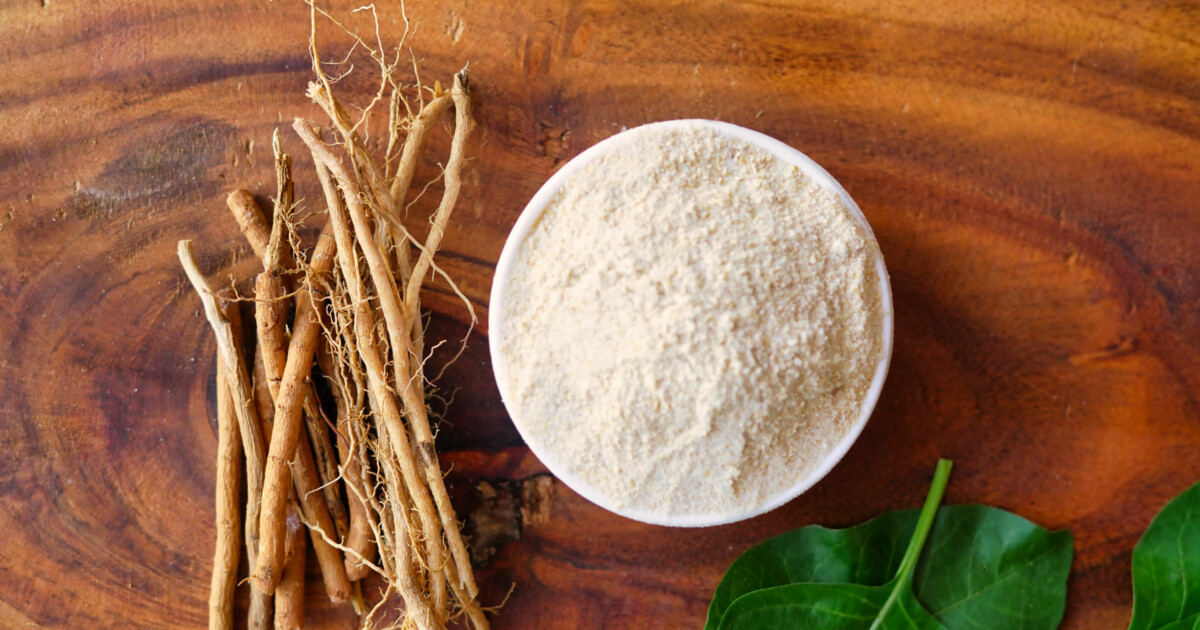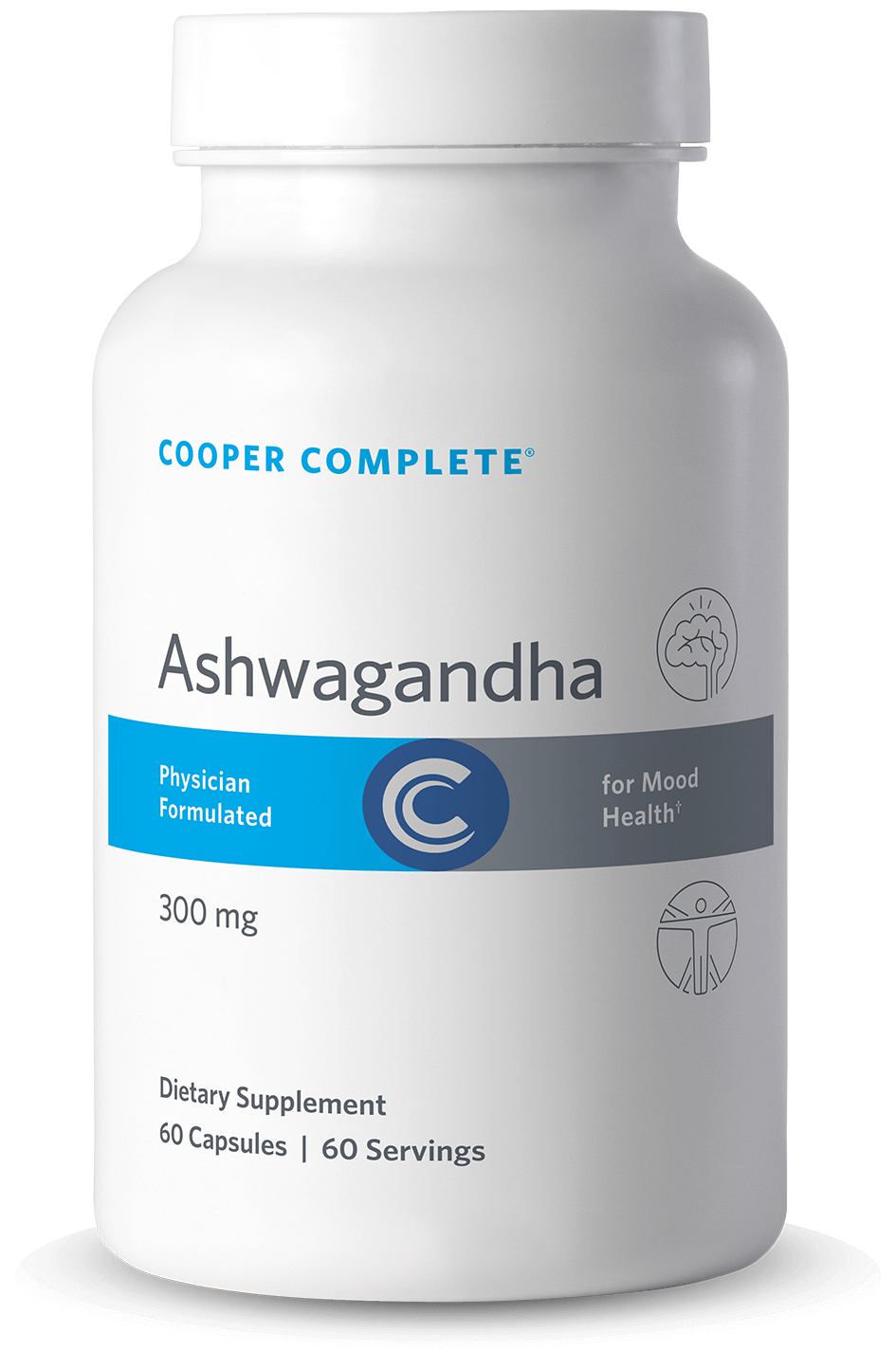The Health Benefits of Ashwagandha

The popularity of ashwagandha supplements in the U.S. has been remarkable in recent years, with market growth almost tripling in 2021 to total more than $92.3 million. Consumers are discovering the mood, stress, sleep and other health benefits of this natural root extract, leading market researchers to project a global market value of $2.5 billion by 2031 for ashwagandha supplements.
Cultivated from the roots of small evergreen shrubs found in dry tropical and subtropical regions of the Middle East, India and some parts of Africa, ashwagandha is also referred to as Indian ginseng and winter cherry. Ashwagandha has been used in traditional Indian medicine to help the body respond to physiological and psychological stress, anxiety and fatigue by exerting normalizing effects upon bodily processes.
The potency of ashwagandha supplements is determined by the withanolide content of the supplement. Withanolides is a family of active ingredients, cultivated from different parts of the ashwagandha plant, with each possessing different health-promoting effects. Withanolide concentration in Cooper Complete Ashwagandha is standardized at 1 percent, with each 300 mg capsule containing 3 mg of withanolides. The recommended dose of ashwagandha is 300-600 mg per day.
While it is recommended to take ashwagandha each morning as part of a daily supplement regimen, individuals having difficulty sleeping or experiencing perimenopausal symptoms should consider taking it before bedtime to take advantage of its calming benefits.

Ashwagandha Supplement 300 mg
Ashwagandha Supplement supports a healthy response to stress, the immune system, restful sleep, and perimenopause discomfort.
$16.98 Add to cartAshwagandha is generally well tolerated, though headache, gastrointestinal or allergic reactions may occur. Ashwagandha is not recommended for:
- Men with hormone-sensitive prostate cancer as ashwagandha supplements may increase testosterone levels
- Pregnant and breastfeeding women
- Individuals with autoimmune or thyroid disorders
Stress and Anxiety
A review of several studies conducted in the U.S. and India indicates ashwagandha may be an effective supplement for reducing stress and anxiety. The sources of ashwagandha (root vs. leaves vs. unspecified parts), doses (250-12,000 mg per day) and withanolide content of each study varied, yet all reported positive improvements in stress and anxiety. Participants reported improved energy, heightened mental clarity, increased well-being and generally more manageable stress.
Another small clinical trial looked at ashwagandha’s role in improving symptoms among patients with generalized anxiety disorder (GAD), comparing its effectiveness to selective serotonin reuptake inhibitors (SSRIs)—the most commonly prescribed antidepressants—and placebo. The study showed a significant 48 percent reduction in GAD and other anxiety metrics, leading researchers to conclude ashwagandha may be a safe and effective adjunctive therapy for GAD patients.
Stress-Related Weight Gain
At the center of the global health crisis, obesity has long been associated with factors that increase cortisol production in the body—including chronic stress. Cortisol is one of the primary hormones involved in the body’s biological response to stress and is known to have a significant correlation with obesity. And of course, stress often leads to changes in eating habits, resulting in weight gain.
One small randomized, double-blind, placebo-controlled study tested ashwagandha’s effectiveness for aiding weight management. Along with its benefits in reducing stress and enhancing well-being, ashwagandha also reduced food cravings and improved eating behavior. Most importantly, the study showed significant reductions in body weight and body mass index among those receiving ashwagandha supplementation, leading researchers to conclude the supplement is helpful to those with chronic stress who are trying to prevent weight gain.
Ashwagandha and Sleep Health
Since stress and anxiety often result in insomnia or poor sleep quality, one might naturally connect ashwagandha to support sleep health. In a systematic review and meta-analysis of five randomized controlled trials containing 400 adults (age 18 and up), sleep quantity and quality were primary outcomes of ashwagandha therapy for patients with insomnia or non-restorative sleep.
In addition to its impact on overall sleep quality, ashwagandha was found to positively impact mental alertness upon awakening and anxiety levels. Effects were more prominent among research subjects diagnosed with insomnia where the treatment dose was 600 mg or more per day and study duration of eight weeks or longer.
Support for Perimenopausal Women
There is clinical evidence that ashwagandha may help women with the symptoms of menopause thanks to its ability to balance hormones and influence hormonal fluctuations. By doing so, ashwagandha can actually help regulate the menstrual cycle.
One randomized study set out to assess ashwagandha’s impact on hot flashes and hormonal parameters in perimenopausal women. The results of the study showed supplementation with ashwagandha produced significant reductions in every level and score used to measure the hormonal effect of menopause, including the menopause rating scale (MRS) and hot flash score. The only hormonal level left unchanged was that of serum testosterone.
Researchers concluded that supplementation with ashwagandha may be an effective and safe option to relieve mild to moderate menopausal symptoms, including hot flashes.
Male Wellbeing and Testosterone
An eight-week randomized controlled study conducted in 2022 investigated the impact of supplementation with ashwagandha root extract on male sexual health and serum testosterone levels. Fifty adult men, all with lower sexual desire, received either 300 mg of ashwagandha root extract or placebo twice daily. Outcomes were assessed at the beginning and end of the eight-week period, measuring the levels of serum testosterone and serum prolactin—a hormone produced by the pituitary gland. Each subject’s answers to the Derogatis interview for sexual functioning-male (DISF-M) questionnaire and a short-form survey of 36 quality-of-life questions were also assessed.
Results of the study showed a statistically significant increase in testosterone levels and DISF-M questionnaire score, though serum prolactin levels remained unchanged. The researchers reported that the findings suggest ashwagandha supplementation produced a significant perception of well-being by participants and assisted in increasing serum testosterone levels.
Muscle Mass and Strength
A study of 57 men ages 18-50, relatively inexperienced in resistance training, were randomly placed into treatment and placebo groups and subjected to baseline measurements before beginning an eight-week resistance training. Supplementation during this period was 600 mg of ashwagandha root extract each day.
Muscle strength was the primary measurement, with secondary assessments of muscle size, body composition, and serum testosterone levels. Muscle recovery was also assessed by evaluating serum creatine kinase levels. The group taking ashwagandha had significantly greater increases in muscle strength and a greater reduction of exercise-induced muscle damage via serum creatine kinase levels. While small, the study suggests ashwagandha supplements may be useful in conjunction with resistance training programs to improve muscle mass and strength. More research is needed for further results validation.
It’s always important to consult your physician before adding any new supplement to your regimen. Your physician understands your health profile best, so talk with them about which supplements are best for you and your medical condition.
Cooper Complete April 5, 2024